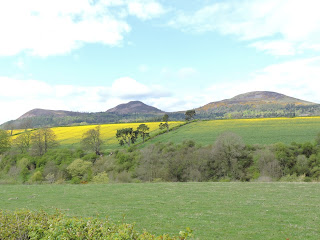This
has been the month of the Riding of the Marches in the Scottish
Border towns commemorating the need in historic times to protect the
town lands against the warlords that were the clan chiefs in pursuit
of land and influence.
At
the Selkirk Common Riding, there is also the remembrance of the
tragedy of the battle of Flodden when the town lost all its young men
save one.
In
the aftermath of that ill-fated encounter and the death of King James
IV, the powerful families vied for control of the kingdom.
Skirmish
Hill near Melrose which has been added to the list of Scottish
battlefields, was the result of the clash of ambitions in the power
vacuum that was 16th century Scotland nearly five hundred years ago.
On
29th July 1526, a cavalry encounter between horsemen, the reivers,
of the Border clans, took place near Darnick where the Waverley Castle hotel stands.
All
the troops were mounted
and would have been armed with lances, swords and dirks. They would
have carried small shields and worn padded
jackets and steel helmets.
Archibald
Douglas, Earl of Angus, was one of the most influential of the
Scottish nobles of the sixteenth century.
He
first came to prominence on 6 August 1514 when he married Margaret,
the Dowager Queen, widow of James IV, mother of James V and elder
sister of Henry VIII of England.
Acting
as guardian to the young king, he sought to control the kingdom.
Becoming
irked by his virtual imprisonment by the Douglas clan, James had
"wrote a quiet and secret writing with his own hand, and sent it to the laird of Buccleugh, beseeking him, that he would come with his kin and friends, and all the force that he might be, and meet him at Melrose at his home passing and there to take him out of the Douglasses hands and to put him to liberty, to use himself among the lave of his lords, as he thinks expedient."
"wrote a quiet and secret writing with his own hand, and sent it to the laird of Buccleugh, beseeking him, that he would come with his kin and friends, and all the force that he might be, and meet him at Melrose at his home passing and there to take him out of the Douglasses hands and to put him to liberty, to use himself among the lave of his lords, as he thinks expedient."
(Pitscottie, 1899:
209-10).
With
a long history of blood feuds and clan rivalries, the Scotts needed no
excuse.
"Wicked
Wat", Walter Scott of Buccleuch summoned his men and their
allies, the Elliots to intercept the Douglases and Maxwells
accompanying the young king.
 |
| Darnick Tower |
It
is said that young James watched the battle from the ramparts of
nearby Darnick Tower.
Coming
down from the Eildon Hills, the Scotts clashed with the king's
retinue and, at first, seemed to prevail but the arrival of Lord Hume
with the Douglas allies, the Kerrs, swung the battle against
Buccleuch.
 |
| The Eildons |
The
Scotts and Elliots retreated, pursued by the Kerrs. The Elliots
turned and made a stand and Andrew Kerr of Cessford was killed.
The
site is supposedly at the Turn-Again Stone though on inspection, the
stone is obviously an ancient standing stone that has been renamed.
 |
| The Turn-Again Stone |
Douglas
won the day but not for long. His wife divorced him, the king escaped
his clutches, he lost power, was imprisoned in France, escaped, fled
to England, returned with armies to Scotland and during all his, for
his times, long life, he strove to advance the power of the
Douglases.
Walter
Scott of Buccleuch led
raids into England in subsequent years, and fought in the battles of
Ancrum Moor and Pinkie during the Rough Wooing. He was eventually
killed in
the street in Edinburgh in 1552 by a group of Kerrs taking revenge
for the death of Andrew Kerr of Cessford.
Such
was the land of Scotland in the sixteenth century, a land of
ruthless, power hungry chiefs where violence was the chosen means of
advancement. It was little wonder that the folk of the Border towns
felt the need to patrol their boundaries.
Today,
these are holidays and a chance to ride the in the cavalcades of up
to three hundred horses through the Border hills but once they were
deadly serious affairs.
For on his soul the slaughter red
Of that unhallowed morn arose, When first the Scott and Car were foes, When royal James beheld the fray, Prize to the victor of the day ; When Home and Douglas, in the van, Bore down Buccleuch's retiring clan, Till gallant Cessford's heart-blood dear Reeked on dark Elliot's border spear (The Lay of the Last Minstrel by Sir Walter Scott)



